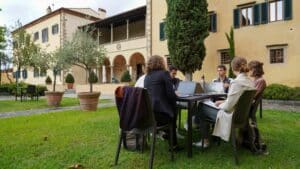In this new 2-day residential course from the Florence School of Regulation, we provide an immersion in the legal and technical framework of the European hydrogen sector.
Over the two days of training, participants will be exposed to the full scope of European hydrogen policy, its political and strategic context, as well as the implications and opportunities it presents for projects.
The course is comprised of the following eight sessions:
Clean hydrogen has grown into an important focus of European energy policy in recent years, with ambition for total consumption increasing 500% from the Hydrogen Strategy of 2020, to the REPowerEU plans of 2022. Since then, clean hydrogen technologies have found a prominent place in key industrial policy documents, namely the Net-Zero Industry Act (NZIA) and Green Deal Industrial Plan (GDIP). These latest developments have further elevated the importance of the sector not only as a driver of decarbonisation and energy security, but also as a vector for industrial reinvigoration in Europe.
The confluence of this high level of ambition and a cross-sectoral scope has brought with it a complex and sophisticated legal and technical framework. Europe is leading the world on clean hydrogen legislation and is setting global benchmarks for some of the most central issues, such as a taxonomy of definitions on hydrogen origin. However, given the novelty of the sector, the rules, governance frameworks, and support mechanisms are all evolving very quickly, with several questions still open. 2024, will be an important year for the nascent clean hydrogen industry, as the Hydrogen and Decarbonised Gas Market Package will be formally adopted, the first two rounds of the European Hydrogen Bank will be concluded, and hydrogen importers will begin having to submit reports on the embedded emissions of their product, as per the phase in of the Carbon Border Adjustment Mechanism (CBAM).
Working with the complex legislative framework for hydrogen requires an understanding of the many interlinked pieces of policy and law.
This course, bringing together leading academics, Commission officials and industry, will provide an in-depth knowledge of the different elements and how they fit together, including:
After completing this course, you’ll be able to:
You’ll get a hands-on learning experience with:
The course is given in English and developed for:
This training course is given in English.
Please note that the number of seats in this course is limited.
At the end of the course, participants will receive a Certificate of Participation.
Please note that both parts of the courses (online and residential) are mandatory to successfully complete it.
Each year, the Florence School of Regulation – Energy and Climate (FSR Energy & Climate) awards scholarships for a wide variety of training courses targeting a broad audience of professionals and academics.
Applications will be assessed by a Selection Committee of FSR members on a yearly basis. The successful candidates will be informed after February 2024 and will be provided with all relevant information on how to enroll in the online course or residential training of their choice.
Send your application by 2 February 2025.
Fees
Contacts: fsr.conferences@eui.eu
The course fee includes:
Please note that the course fee does not cover travel and accommodation costs.
Discounts
Special offer for group enrolments: 10% discount from 5 participants from the same organisation.
Cancellation policy
Paid registration fee is non-refundable. However, registrant substitution may be made up to 20 days before the start date of the course.
For more information, please read the full FSR cancellation policy.

Ensuring a Sustainable and Competitive Future for EU Agriculture The Vision for Agriculture and Food (EC, 2025) sets out an ambitious roadmap for the future of farming and food in…

Learn the fundamental regulatory principles of the electricity and gas sectors through hands-on, real case activities and examples with instructors from national regulatory authorities from Europe and North America, the…

Participate in the most pressing debates on the regulation of transport in the European Union through hands-on activities based on real cases and examples presented by academics, regulatory authorities and…

The role of space in tackling real-world challenges is still emerging, yet it holds the potential to transform every aspect of our daily lives, economies, and digital futures. To realise…

The Energy Law Research School seeks to offer emerging scholars (doctoral and postdoctoral researchers) in EU energy law the opportunity to gain an understanding of the most important issues in…

Crafting research with impact on energy policy and regulation LARS is a residential training addressing researchers with modeling skills who are keen to support the energy policy and regulatory debate.…

EU Electricity Network Codes & the Clean Energy Package Enter the world of electricity markets in Europe ‘Evolution of electricity markets in Europe’ is an 8-week online course in collaboration…

2025 marks the tenth anniversary of the Paris Agreement. The ‘Getting to Net Zero’ course at the Florence School of Regulation aims to provide an overview of the role of the…

This new training course on the Regulation and Integration of Renewable Energy provides a comprehensive introduction to the topic with the latest updates, including developments in policy and regulation in…
To meet, discuss and learn in the channel that suits you best.